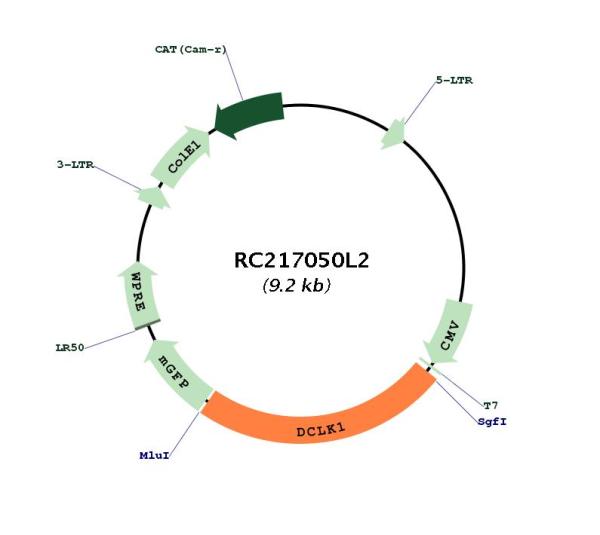DCAMKL1 (DCLK1) (NM_004734) Human Tagged Lenti ORF Clone
CAT#: RC217050L2
- LentiORF®
Lenti ORF clone of Human doublecortin-like kinase 1 (DCLK1), transcript variant 1, mGFP tagged
"NM_004734" in other vectors (6)
USD 365.00
Specifications
| Product Data | |
| Type | Human Tagged ORF Clone |
| Tag | mGFP |
| Symbol | DCAMKL1 |
| Synonyms | CL1; CLICK1; DCAMKL1; DCDC3A; DCLK |
| Vector | pLenti-C-mGFP |
| E. coli Selection | Chloramphenicol (34 ug/mL) |
| Mammalian Cell Selection | None |
| Sequence Data |
The ORF insert of this clone is exactly the same as(RC217050).
|
| Restriction Sites |
SgfI-MluI
Cloning Scheme for this gene
Plasmid Map

|
| ACCN | NM_004734 |
| ORF Size | 2187 bp |
| OTI Disclaimer | Due to the inherent nature of this plasmid, standard methods to replicate additional amounts of DNA in E. coli are highly likely to result in mutations and/or rearrangements. Therefore, OriGene does not guarantee the capability to replicate this plasmid DNA. Additional amounts of DNA can be purchased from OriGene with batch-specific, full-sequence verification at a reduced cost. Please contact our customer care team at custsupport@origene.com or by calling 301.340.3188 option 3 for pricing and delivery. The molecular sequence of this clone aligns with the gene accession number as a point of reference only. However, individual transcript sequences of the same gene can differ through naturally occurring variations (e.g. polymorphisms), each with its own valid existence. This clone is substantially in agreement with the reference, but a complete review of all prevailing variants is recommended prior to use. More info |
| OTI Annotation | This clone was engineered to express the complete ORF with an expression tag. Expression varies depending on the nature of the gene. |
| Product Components | The ORF clone is ion-exchange column purified and shipped in a 2D barcoded Matrix tube containing 10ug of transfection-ready, dried plasmid DNA (reconstitute with 100 ul of water). |
| Reconstitution | 1. Centrifuge at 5,000xg for 5min. 2. Carefully open the tube and add 100ul of sterile water to dissolve the DNA. 3. Close the tube and incubate for 10 minutes at room temperature. 4. Briefly vortex the tube and then do a quick spin (less than 5000xg) to concentrate the liquid at the bottom. 5. Store the suspended plasmid at -20°C. The DNA is stable for at least one year from date of shipping when stored at -20°C. |
| Reference Data | |
| RefSeq | NM_004734.2 |
| RefSeq Size | 5703 bp |
| RefSeq ORF | 2190 bp |
| Locus ID | 9201 |
| UniProt ID | O15075 |
| Cytogenetics | 13q13.3 |
| Domains | pkinase, TyrKc, S_TKc, DCX |
| Protein Families | Druggable Genome, Protein Kinase |
| MW | 80.9 kDa |
| Gene Summary | This gene encodes a member of the protein kinase superfamily and the doublecortin family. The protein encoded by this gene contains two N-terminal doublecortin domains, which bind microtubules and regulate microtubule polymerization, a C-terminal serine/threonine protein kinase domain, which shows substantial homology to Ca2+/calmodulin-dependent protein kinase, and a serine/proline-rich domain in between the doublecortin and the protein kinase domains, which mediates multiple protein-protein interactions. The microtubule-polymerizing activity of the encoded protein is independent of its protein kinase activity. The encoded protein is involved in several different cellular processes, including neuronal migration, retrograde transport, neuronal apoptosis and neurogenesis. This gene is up-regulated by brain-derived neurotrophic factor and associated with memory and general cognitive abilities. Multiple transcript variants generated by two alternative promoter usage and alternative splicing have been reported, but the full-length nature and biological validity of some variants have not been defined. These variants encode different isoforms, which are differentially expressed and have different kinase activities.[provided by RefSeq, Sep 2010] |
Documents
| Product Manuals |
| FAQs |
| SDS |
Resources
Other Versions
| SKU | Description | Size | Price |
|---|---|---|---|
| RC217050 | DCLK1 (Myc-DDK-tagged)-Human doublecortin-like kinase 1 (DCLK1), transcript variant 1 |
USD 1,001.00 |
|
| RC217050L1 | Lenti ORF clone of Human doublecortin-like kinase 1 (DCLK1), transcript variant 1, Myc-DDK-tagged |
USD 1,301.00 |
|
| RC217050L3 | Lenti ORF clone of Human doublecortin-like kinase 1 (DCLK1), transcript variant 1, Myc-DDK-tagged |
USD 1,301.00 |
|
| RC217050L4 | Lenti ORF clone of Human doublecortin-like kinase 1 (DCLK1), transcript variant 1, mGFP tagged |
USD 1,301.00 |
|
| RG217050 | DCLK1 (tGFP-tagged) - Human doublecortin-like kinase 1 (DCLK1), transcript variant 1 |
USD 1,201.00 |
|
| SC314561 | DCLK1 (untagged)-Human doublecortin-like kinase 1 (DCLK1), transcript variant 1 |
USD 1,002.00 |
{0} Product Review(s)
Be the first one to submit a review






























































































































































































































































 Germany
Germany
 Japan
Japan
 United Kingdom
United Kingdom
 China
China


